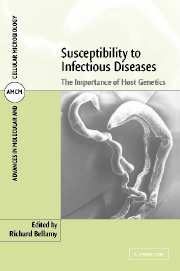Book contents
- Frontmatter
- Contents
- Contributors
- 1 Introduction
- 2 Application of genetic epidemiology to dissecting host susceptibility/resistance to infection illustrated with the study of common mycobacterial infections
- 3 The diverse genetic basis of immunodeficiencies
- 4 Genetic diversity in the major histocompatibility complex and the immune response to infectious diseases
- 5 The cystic fibrosis transmembrane conductance regulator
- 6 The influence of inherited traits on malaria infection
- 7 Polymorphic chemokine receptor and ligand genes in HIV infection
- 8 NRAMP 1 and resistance to intracellular pathogens
- 9 The interleukin-12/interferon-γ loop is required for protective immunity to experimental and natural infections by Mycobacterium
- 10 Mannose-binding lectin deficiency and susceptibility to infectious disease
- 11 Blood group phenotypes and infectious diseases
- 12 Genetics of human susceptibility to infection and hepatic disease caused by schistosomes
- 13 Genetic susceptibility to prion diseases
- Index
- Plate section
4 - Genetic diversity in the major histocompatibility complex and the immune response to infectious diseases
Published online by Cambridge University Press: 14 August 2009
- Frontmatter
- Contents
- Contributors
- 1 Introduction
- 2 Application of genetic epidemiology to dissecting host susceptibility/resistance to infection illustrated with the study of common mycobacterial infections
- 3 The diverse genetic basis of immunodeficiencies
- 4 Genetic diversity in the major histocompatibility complex and the immune response to infectious diseases
- 5 The cystic fibrosis transmembrane conductance regulator
- 6 The influence of inherited traits on malaria infection
- 7 Polymorphic chemokine receptor and ligand genes in HIV infection
- 8 NRAMP 1 and resistance to intracellular pathogens
- 9 The interleukin-12/interferon-γ loop is required for protective immunity to experimental and natural infections by Mycobacterium
- 10 Mannose-binding lectin deficiency and susceptibility to infectious disease
- 11 Blood group phenotypes and infectious diseases
- 12 Genetics of human susceptibility to infection and hepatic disease caused by schistosomes
- 13 Genetic susceptibility to prion diseases
- Index
- Plate section
Summary
INTRODUCTION: THE NATURAL HISTORY OF INFECTIOUS DISEASES
The natural history of many infectious diseases is characterised by a broad range of clinical outcomes. For example, infection with bacterial agents such as Mycobacterium tuberculosis may be asymptomatic in some individuals; in others, clinical manifestations of disseminated tuberculosis may develop. Infection with viral agents such as the hepatitis B virus (HBV) may result in spontaneous clearance in some individuals, whereas in others, chronic infection may develop. Among those with chronic HBV infection, disease progression proceeds at varied rates, with some individuals developing liver cirrhosis and others only mild amounts of liver fibrosis despite similar durations of infection. Protozoan organisms, such as Plasmodium, are similarly characterised by a broad spectrum of outcomes. Some individuals may suffer from a severe course of malaria with cerebral manifestations or malarial anaemia, whereas others may naturally avoid such severe sequelae.
What factors influence this broad clinical spectrum in so many different diseases? Infectious disease natural history is affected by four main factors. First, pathogen virulence may determine outcome. For example, some strains of influenza virus cause only mild flu symptoms, whereas others have resulted in a global pandemic, such as the strain that killed millions of individuals across the world in 1918. Second, external modulators, or environmental factors, may affect outcome. For example, some strains of influenza virus cause only mild flu symptoms, whereas others have resulted in a global pandemic, such as the strain that killed millions of individuals across the world in 1918.
- Type
- Chapter
- Information
- Susceptibility to Infectious DiseasesThe Importance of Host Genetics, pp. 77 - 116Publisher: Cambridge University PressPrint publication year: 2003
- 1
- Cited by



